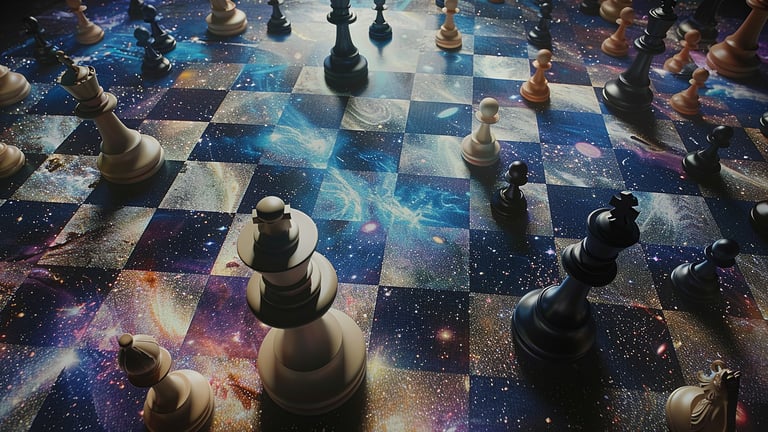Mastering the game

16.04.2024

In the world of investing, as in chess, a nearly infinite magnitude on information and possible combinations are available to be processed. Chess is a game where all information is on the table while human ingenuity and the cold calculations of machines clash in an endless, infinite battle for success.
Clash of the titans: Kasparov vs. Deep Blue
In the annals of chess history, one match stands out as a pivotal moment that echoed through the corridors of intellect and strategy. It was 1996, and Garry Kasparov, the reigning world chess champion, was about to face an opponent that would test the limits of human intelligence like never before. Across the board sat Deep Blue, an IBM supercomputer designed with the singular purpose of challenging the greatest minds in chess.
This clash of man and machine wasn't just a game—it was a psychological thriller unfolding in real time. Kasparov, known for his brilliant strategic manoeuvres and unrelenting pursuit of victory, faced a foe devoid of emotion, fatigue, or fear. It was the human brain versus the cold, calculating algorithms of Deep Blue.
As the game progressed, the world watched in awe as Kasparov sought to outwit a machine that seemed to know every move before it was made. Deep Blue, with its lightning-fast calculations and precise analysis, posed a formidable challenge. Yet, Kasparov held his ground, tapping into the depths of human intuition and creativity.
Then came the moment that would reverberate through history. In a stunning twist, Deep Blue made a move so unexpected, so unconventional, that it caught even Kasparov off guard. Seizing the opportunity, Kasparov launched a counterattack that left the machine reeling. The champion emerged victorious, but the world had witnessed a glimpse of the future—where the boundaries between man and machine blurred.
However, the story didn't end there. A year later, in 1997, came the rematch that would forever change the narrative. This time, Deep Blue emerged triumphant, marking a turning point in the age-old battle between humans and computers.
That historic moment was captured by a remark from Kasparov which still haunts many:
"I could feel, I could smell a new kind of intelligence across the table." Fascination and fears are natural friends, especially when it comes to technological process. Humans see both, the benefits and the risk of an erosion of the value in human capital.
This epic encounter between Kasparov and Deep Blue revealed the essence of chess as a microcosm of the human condition. In chess, as in life, it's not just about the moves on the board—it's about the psychology, the strategy, and the infinite possibilities that unfold with each decision.
The wisdom of chess applied to investing
Chess, with its opus of moves and counter-moves, mirrors the complexities of the investing world. It's a game where every decision feels like having all information and chips on the table, where the market offers a semblance of symmetry amidst the chaos. Just as in chess, it's your brain versus the other brain, with no referees to blame or chips to gamble. Even though all information is on the table, chess as a game has survived all industrial and technological revolutions. It's estimated that the number of possible positions in the course of a chess is around 10^120 (…a rough estimate that this crossover point would occur after around 40 to 50 moves into the game. Disclaimer: opinions and estimates with regards to this figures differ) while the estimated number of atoms in the observable universe is roughly 10^80. Many other “old” games where all information are on the table died a slow death in the wake of the data storage- and early-stage AI improvements during the 1990s (where Poker probably became even more popular, as “unknows” are/were needed).
On the chessboard, you see all the pieces laid bare—a brutally honest game that partially reflects the society from which it emerges. Consider the rise of competitive chess as a show of intellectual power during the Cold War years. Over many centuries, the game has evolved with the societies that play it, and yes, chess had its tulip and railway mania events too.
In the world of investing, the parallels are striking. Algorithms and CTAs may offer efficiency and speed, but they lack the nuanced and contextual understanding of human behaviour. While investing, we optimize investors' portfolios not just with mathematical precision but with a deep understanding of their needs, aspirations, and risk tolerances—which are subject to change even in the absence of pure “rationals”.
Having stimulated and trained my own chess skills largely on a chess program called “Fritz” (experienced chess players among the audience know the program) I got confronted with the reality, i.e. that I am a normal average chess player: Good when it comes to the opening, “OK” when it comes to the middle game and inferior vs. the computer when it comes to the endgame. However, this follows a common behaviour or skill set when it comes to “human vs. chess computers”. The opening, which can be described as the phase where the game is “strategic”, is the part where we typically look rather competitive, i.e. charting a course through uncharted waters with a blend of analysis, instinct, and a clear strategy. At the same time, we become less competitive the more the game becomes open and more tactical…
Indeed, among other features Fritz teaches you to solve various pre-defined “chess problems”, such opening patterns, positional plays, endgames, etc;
The middle game of investing is a “strategic-tactical” hybrid, where humans and computers dance in a delicate balance. Here, we navigate the shifting tides of the market, adjusting strategies based on new information and changing dynamics. It's a phase where human insight meets computational power, creating a synergy that can lead to success. It's in the endgame where computers often excel. In the final stages, with fewer variables and clearer paths, computers can optimise decisions with precision. Indeed, aside from the world’s best chess players there is evidence that human skills are tilted in favour of the opening and (partially) middle game, which goes on the expense of the endgame for a given level.
The human touch in an era of uncertainty
In today's markets, where there is increasing uncertainty in many fields, the human touch becomes more crucial. When markets are unpredictable, it's the trust element which becomes more important all else equal. We build relationships, hold our investors' hands through turbulent times, and provide the reassurance and guidance needed to weather the storm. And in a world of increasing complexity and uncertainty, it's this human touch that often makes the crucial difference between success and failure. In a world of completely over-indebted governments, outrageously high budget deficits, “human-right’ization” of fiscal policy and the rise of populism in an already stretched geopolitical backdrop, successful investing is more than good performance as the quality of performance is crucial. This requires a fair amount of contextual and cognitive thinking, which involves mental processes that contribute to understanding and making sense of information. Here is where we come full circle: I can’t imagine a better way to stimulate these abilities than playing chess.
This brings us back to the core of the chess analogy in investing. Just as Kasparov had to refocus his strengths in the face of Deep Blue's challenge, investors must adapt to the rise of AI and technological advancements. We must blend human ingenuity with AI, leveraging the strengths of both to create the best strategies for our investors.
In the current market environment, the allure of AI and its potential for growth is undeniable. But amidst the excitement, we must also tread carefully, asking the nuanced questions about where humans excel and where computers shine. Let alone the ethical questions that need answering. I am reminded of Amara’s Law, named after the futurist Roy Amara, that states how humans tend to overestimate the impact of technologies in the short run and underestimate them in the long run.
This is why, as we stand on the cusp of exponential growth, the lessons of the past and the wisdom of chess come in handy to think about what’s to come. We must embrace the possibilities that arise from the combination of human insight and technological innovation. It's about owning the overarching strategy, adjusting based on strong relationships and trust, while letting AI optimise processes, portfolios and reduce blind spots.
So, the next time you ponder investment strategies, remember the lessons of chess. Consider the psychology, the strategy, and the infinite possibilities that lie ahead. And know that in this ever-evolving game of investing, the humans still have some advantages ahead of the robots. For in the end, it's not just about the moves we make—it's about the journey, the growth, and the relentless pursuit of something better. As Kasparov, and many others once said, "Nothing is bigger than the universe." And perhaps, in the vast expanse of possibilities, lies the key to success.
Michael Lienhard is Head of Fixed Income at Cape Capital